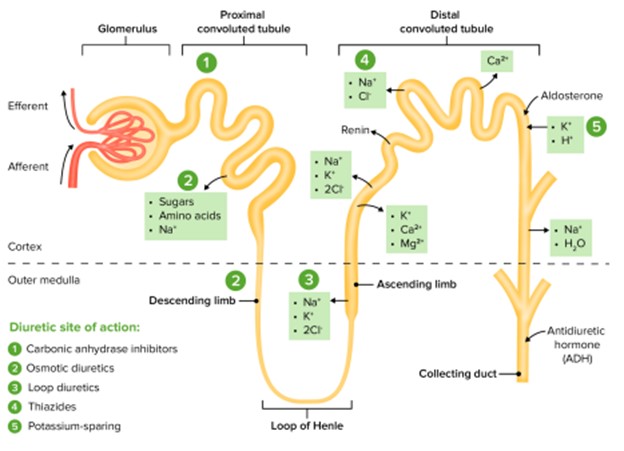A nurse practitioner orders 1 liter of 0.9% normal saline to infuse over 6 hours. How many milliliters per hour will the nurse program the IV infusion device? Round off.
160 ml/hr
125 ml/hr
100 ml/hr
167 ml/hr
The Correct Answer is D
To calculate the milliliters per hour (mL/hr) for the IV infusion, you divide the total volume (in milliliters) by the total time (in hours).
In this case, the total volume is 1 liter, which is equal to 1000 milliliters, and the total time is 6 hours.
So, you divide 1000 mL by 6 hours:
1000 mL / 6 hours = 166.67 mL/hr
Rounding off, the nurse will program the IV infusion device to infuse at approximately 167 mL/hr.
Nursing Test Bank
Naxlex Comprehensive Predictor Exams
Related Questions
Correct Answer is ["A","B","C","D","E","F"]
Explanation
Ensure the client receives adequate amounts of fluids: This is important to maintain hydration and thin respiratory secretions, making it easier for the client to cough and clear the airways. Check the client's mouth for stomatitis: Methylprednisolone can increase the risk of developing oral candidiasis (thrush) or stomatitis, which can cause discomfort and interfere with oral intake. Regular mouth checks can help identify these conditions early for appropriate management. Assess the client's mental status: Pneumonia, particularly in individuals with pre-existing lung disease like COPD, can lead to hypoxemia, which may affect mental status. It is important to monitor the client's mental status, as changes in cognition or confusion can be indicators of hypoxia and require prompt intervention.
Monitor for signs of hypokalemia: Methylprednisolone, like other corticosteroids, can cause electrolyte imbalances, including hypokalemia (low potassium levels). Hypokalemia can have various effects on the body, including muscle weakness and cardiac dysrhythmias. Regular monitoring of potassium levels and signs of hypokalemia is important for timely management. Monitor the client's blood glucose levels: Methylprednisolone can increase blood glucose levels, particularly in individuals with pre-existing diabetes or impaired glucose tolerance. Regular monitoring of blood glucose levels is necessary to ensure proper glycemic control and prevent hyperglycemia-related complications.
Monitor the client's blood pressure for hypotension: Corticosteroids like methylprednisolone can cause fluid retention, leading to an increase in blood pressure. However, sudden withdrawal of corticosteroids can result in adrenal insufficiency and hypotension. Close monitoring of blood pressure is necessary to identify any significant changes and adjust the medication regimen accordingly.

Correct Answer is C
Explanation
Loop diuretics, such as furosemide, are known to promote diuresis (increased urine output) and can cause electrolyte imbalances, including low potassium (hypokalemia). The patient's statement about eating a diet rich in potassium-containing foods like potatoes, bananas, avocadoes, strawberries, and spinach is incorrect in this context. These foods are indeed good sources of potassium, but when taking loop diuretics, it is necessary to monitor and potentially restrict potassium intake to prevent excessive potassium levels.
"I will weigh myself daily and report to my physician if I gain more than 3 lbs in 1 day." This statement reflects the patient's understanding of the need to monitor their weight daily as a means of assessing fluid balance. Rapid weight gain may indicate fluid retention, which should be reported to the physician.
"This medication can cause dehydration, so I will stay hydrated by consuming at least 2 L or more of fluid per day." This statement demonstrates awareness of the potential for dehydration when taking loop diuretics and the importance of staying adequately hydrated by consuming an appropriate amount of fluids.
"I will change position slowly because I can become dizzy easily while taking this medication." This statement reflects the understanding that loop diuretics can cause orthostatic hypotension,
leading to dizziness upon sudden changes in position. Taking precautions and changing position slowly can help prevent falls and related injuries.

Whether you are a student looking to ace your exams or a practicing nurse seeking to enhance your expertise , our nursing education contents will empower you with the confidence and competence to make a difference in the lives of patients and become a respected leader in the healthcare field.
Visit Naxlex, invest in your future and unlock endless possibilities with our unparalleled nursing education contents today
Report Wrong Answer on the Current Question
Do you disagree with the answer? If yes, what is your expected answer? Explain.
Kindly be descriptive with the issue you are facing.
